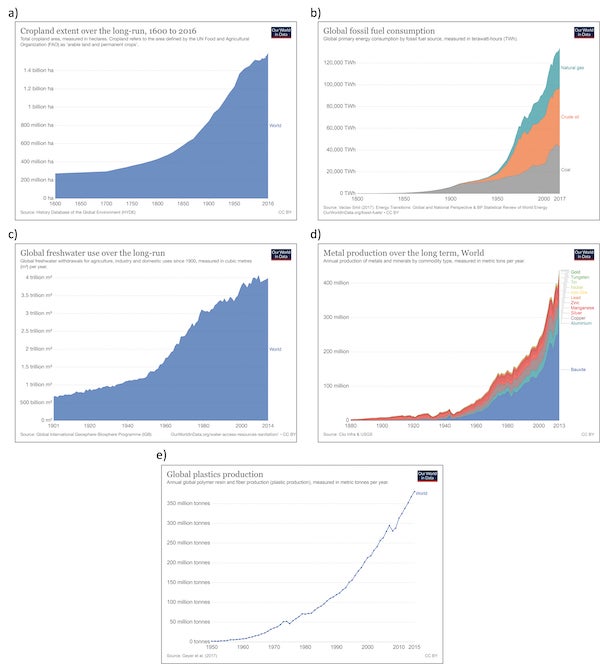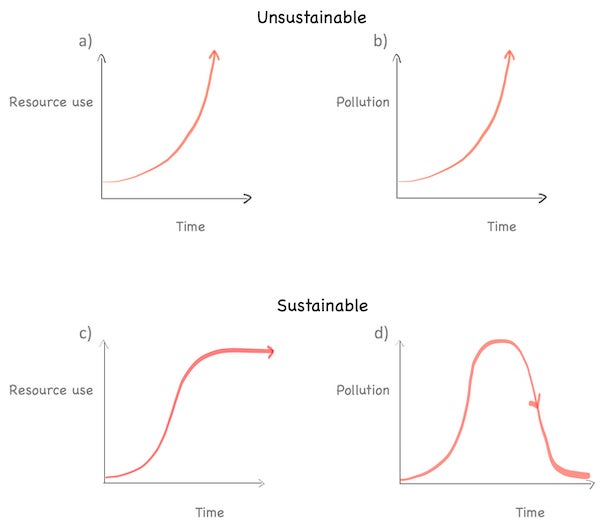while not an exact fan of YouTuber EE(Economics Explained), they do tend to make some interesting analysis videos(from the neo-liberal perspective) on certain economic concepts and patterns that play out in practice. however, with this video they've made; they seem to conclude that infinite growth is possible on a finite world, not giving much thought to the physical constraints associated with an environment like ours and the environmental costs incurred in the name of growth.
thankfully, climate physicist Chirag Dhara and Vandana Singh who's a professor of physics point out the disconnects with an economic system centered solely on growth.
If you can't read the article, here's the text:
The electric vehicle (EV) has become one of the great modern symbols of a world awakened to the profound challenges of unsustainability and climate change. So much so that we may well imagine that Deep Thought’s answer today to Life, the Universe and Everything might plausibly be “EV.” But, as Douglas Adams would surely have asked, if electric vehicles are the answer, what is the question?
Let us imagine the “perfect” EV: solar powered, efficient, reliable and affordable. But is it sustainable? EVs powered by renewable energy may help reduce the carbon footprint of transport. Yet, the measure of sustainability is not merely the carbon footprint but the material footprint: the aggregate quantity of biomass, metal ores, construction minerals and fossil fuels used during production and consumption of a product. The approximate metric tonne weight of an EV constitutes materials such as metals (including rare earths), plastics, glass and rubber. Therefore, a global spike in the demand for EVs would drive an increased demand for each of these materials.
Every stage of the life cycle of any manufactured product exacts environmental costs: habitat destruction, biodiversity loss and pollution (including carbon emissions) from extraction of raw materials, manufacturing / construction, through to disposal. Thus, it is the increasing global material footprint that is fundamentally the reason for the twin climate and ecological crises.
The global material footprint has grown in lockstep with the exponentially rising global economy (GDP) since the industrial revolution. This is largely because of egregious consumption by thesuper-affluentin a socioeconomic system founded on growth without limits. Can we resolve this fundamental conflict between the quest for limitless growth and the consequent environmental destruction?
Industrial era exponential rise in the use of primary and derived physical resources: cropland (a), fossil fuels (b), freshwater (c), metals (d), plastic (e). Credit: Our World in Data (CC BY-SA 3.0 AU)
ENTER TECHNOLOGY
Technological innovation and efficiency improvements are often cited as pathways to decouple growth in material use from economic growth. While technology undoubtedly has a crucial role to play in the transition to a sustainable world, it is constrained by fundamental physical principles and pragmatic economic considerations.
Examples abound. The engine efficiency of airplanes has improved little for decades since they have long been operating close to their theoretical peak efficiency. Likewise, there is a hard limit on the efficiency of photovoltaic cells of about 35 percent because of the physical properties of the semiconductors that constitute them; in practice few exceed 20 percent for economic and pragmatic reasons. The power generation of large wind farms is limited to about one watt per square meter as a simple yet utterly unavoidable physical consequence of wake effects. The awesome exponential increase in computing power of the past five decades will end by about 2025 since it is physically impossible to make the transistors on the computer chip, already roughly 5 percent of the size of the coronavirus, much smaller.
Whether it is principles of classical, quantum or solid state physics or thermodynamics, each places different but inexorable constraints on technological solutions. Basically, physical principles that have allowed incredible technological leaps over the past century also inevitably limit them. We might consider that extensive recycling of materials would offset efficiency limits. Recycling is crucial; however, while glass and metals can be recycled almost indefinitely without loss of quality, materials such as paper and plastic can be recycled only a few times before becoming too degraded.
Additionally, recycling itself may be an energy- and materials-intensive process. Even if physical laws could be broken (they cannot) to achieve recycling with 100 percent efficiency, added demand from the imperative for economic growth would necessarily require virgin materials. The key point is that efficiency is limited by physics, but there is no sufficiency limit on the socioeconomic construct of “demand.”
Unfortunately, the situation is even more dire. Economic growth is required to be exponential; that is, the size of the economy must double in a fixed period. As referenced earlier, this has driven a corresponding increase in the material footprint. To understand the nature of exponential growth, consider the EV. Suppose that we have enough (easily extractable) lithium for the batteries needed to fuel the EV revolution for another 30 years. Now assume that deep-sea mining provides four times the current amount of these materials. Are we covered for 120 years? No, because the current 10 percent rate of growth in demand for lithium is equivalent to doubling of demand every seven years, which means we would only have enough for 44 years. In effect, we would cause untold, perhaps irreversible, devastation of marine ecosystems to buy ourselves a few extra years’ supply of raw materials.
Exponential growth swiftly, inevitably, swamps anything in finite supply. For a virus, that finite resource is the human population and in the context of the planet it is its physical resources.
The inescapable inference is that it is essentially impossible to decouple material use from economic growth. And this is exactly what has transpired. Wiedmann et al., 2015 did a careful accounting of the material footprint, including those embedded in international trade, for several nations. In the 1990–2008 period covered by the study, no country achieved a planned, deliberate economywide decoupling for a sustained length of time. Claims by the Global North to the contrary conceal the substantial offshoring of its production, and the associated ecological devastation, to the Global South.
Recent proposals for ecocidal deep-sea and fantastical exoplanetary mining are an unsurprising consequence of a growth paradigm that refuses to recognize these inconvenient truths.
WHAT IS SUSTAINABILITY?
These observations lead us to a natural minimum condition for sustainability: all resource use curves must be simultaneously flatlined and all pollution curves simultaneously extinguished. It is this resource perspective that allows us to see why EVs may help offset carbon emissions yet remain utterly unsustainable under the limitless growth paradigm.
Sustainability from a resource perspective: Exponentially rising resource use and pollution (a and b) are unsustainable. We define sustainability as flatlined resource use (c) and extinguished pollution (d). Credit: Aditi Deshpande
THE REAL QUESTION
We have argued that the inextricable link between material consumption and GDP makes the infinite-growth paradigm incompatible with sustaining ecological integrity. Thus, while EVs constitute a partial answer to the climate question, within the current paradigm they will only exacerbate the larger anthropogenic crises connected to unsustainable resource consumption.
The real question is this: how do we transition to alternative economic paradigms founded on the reconciliation of equitable human well-being with ecological integrity?




